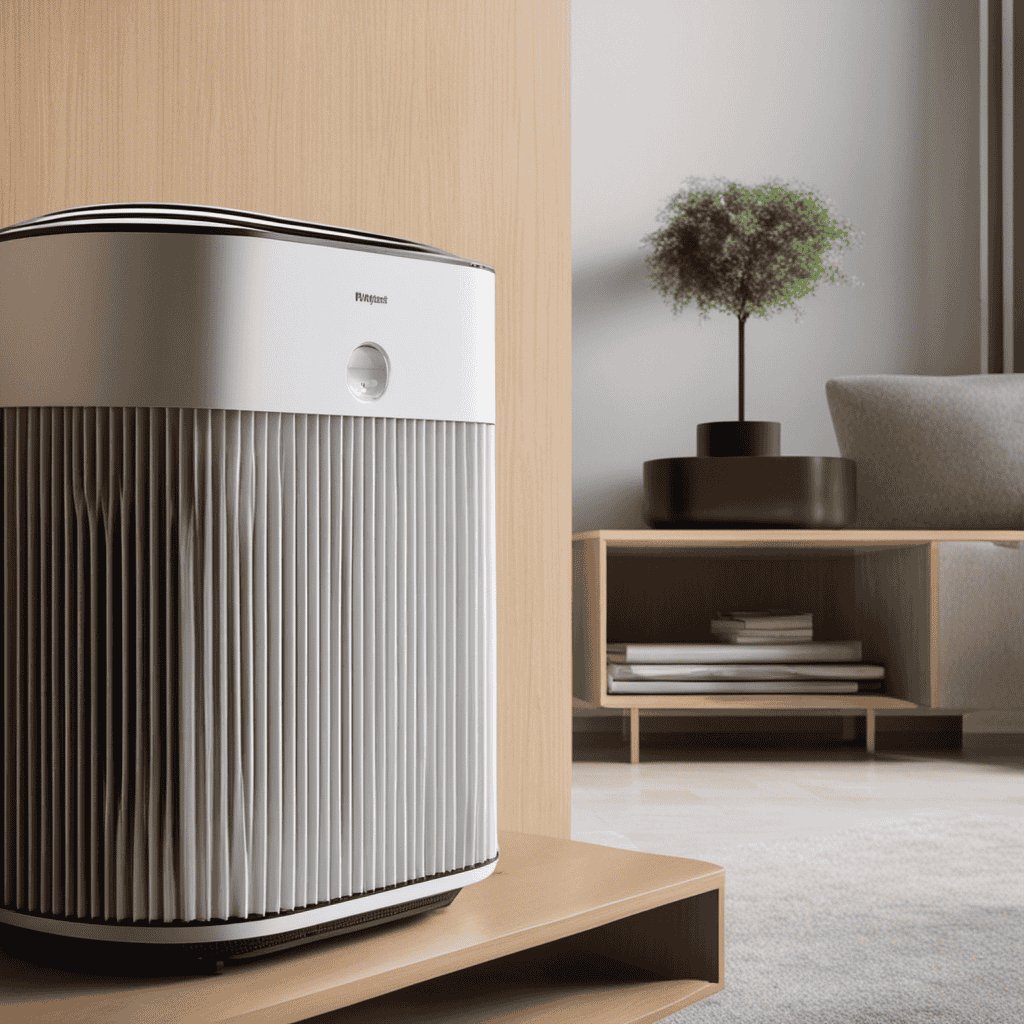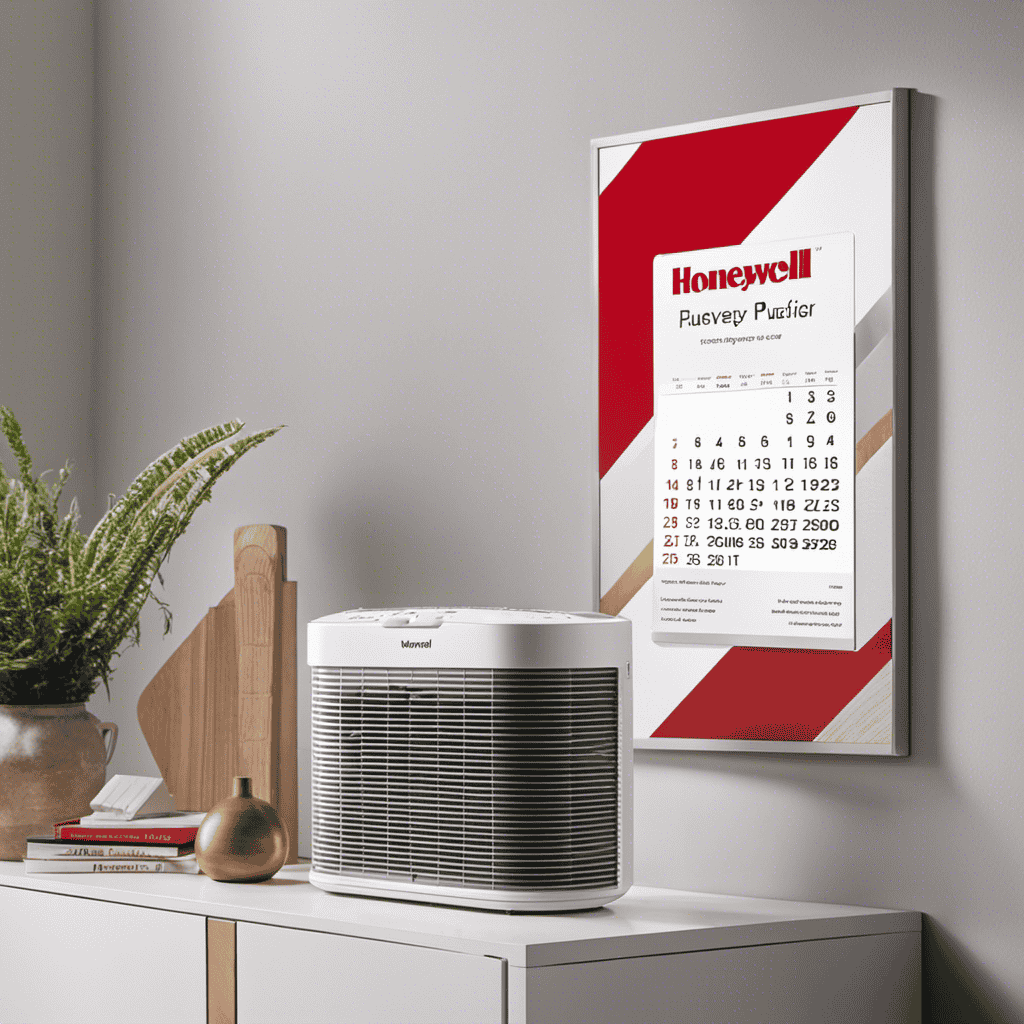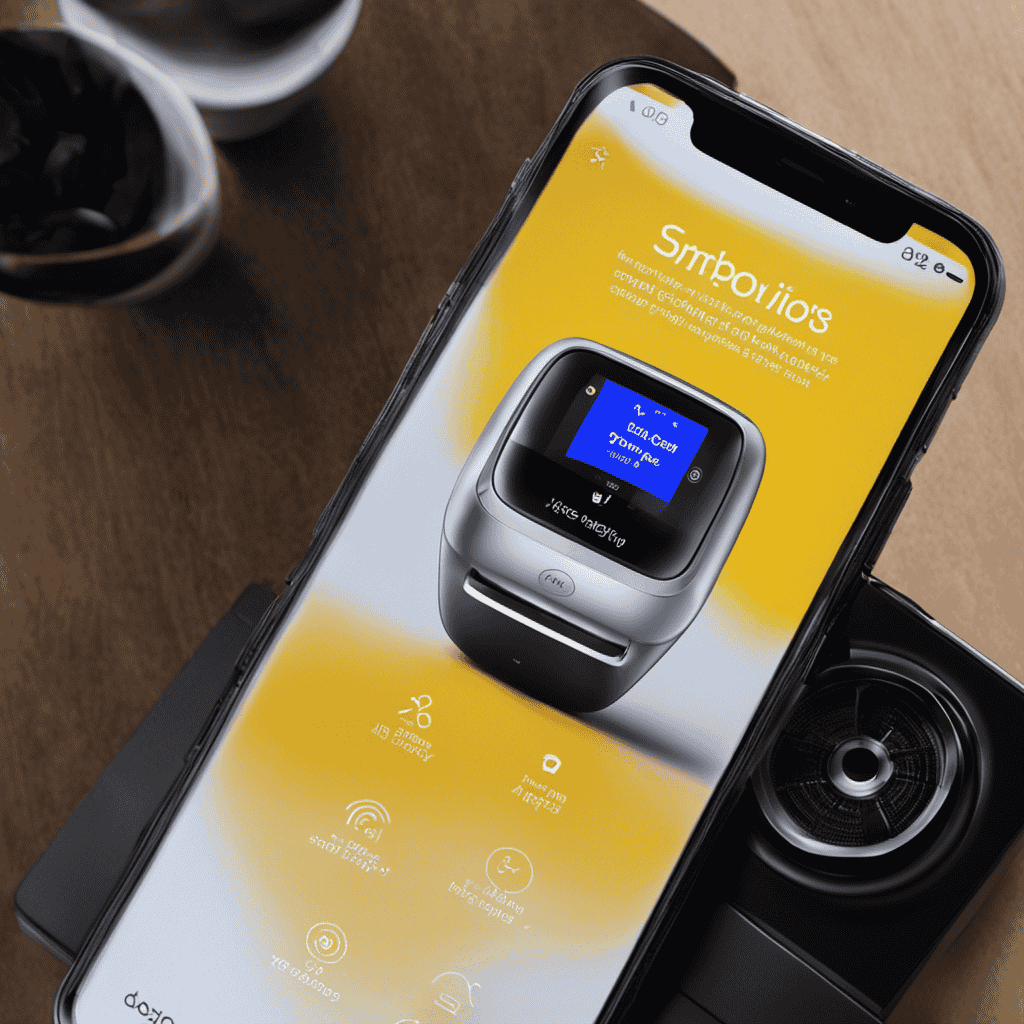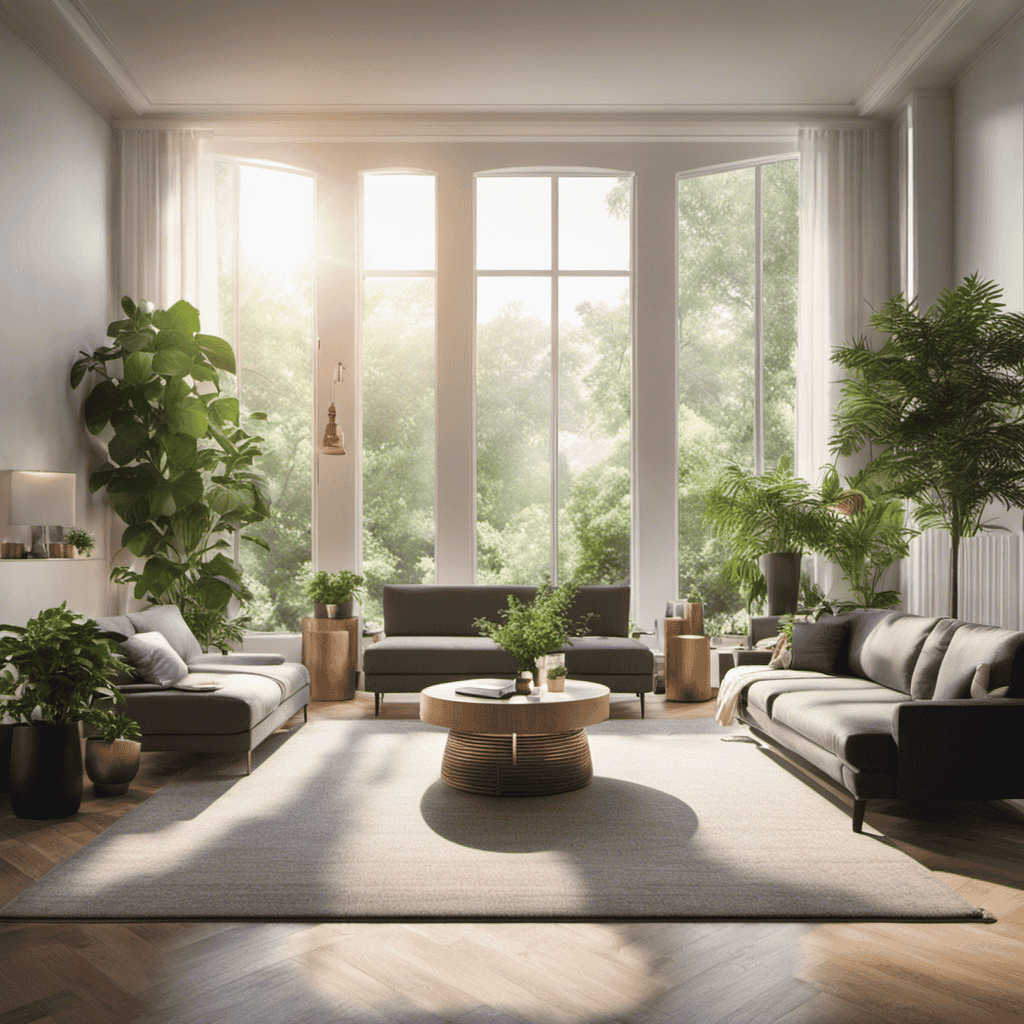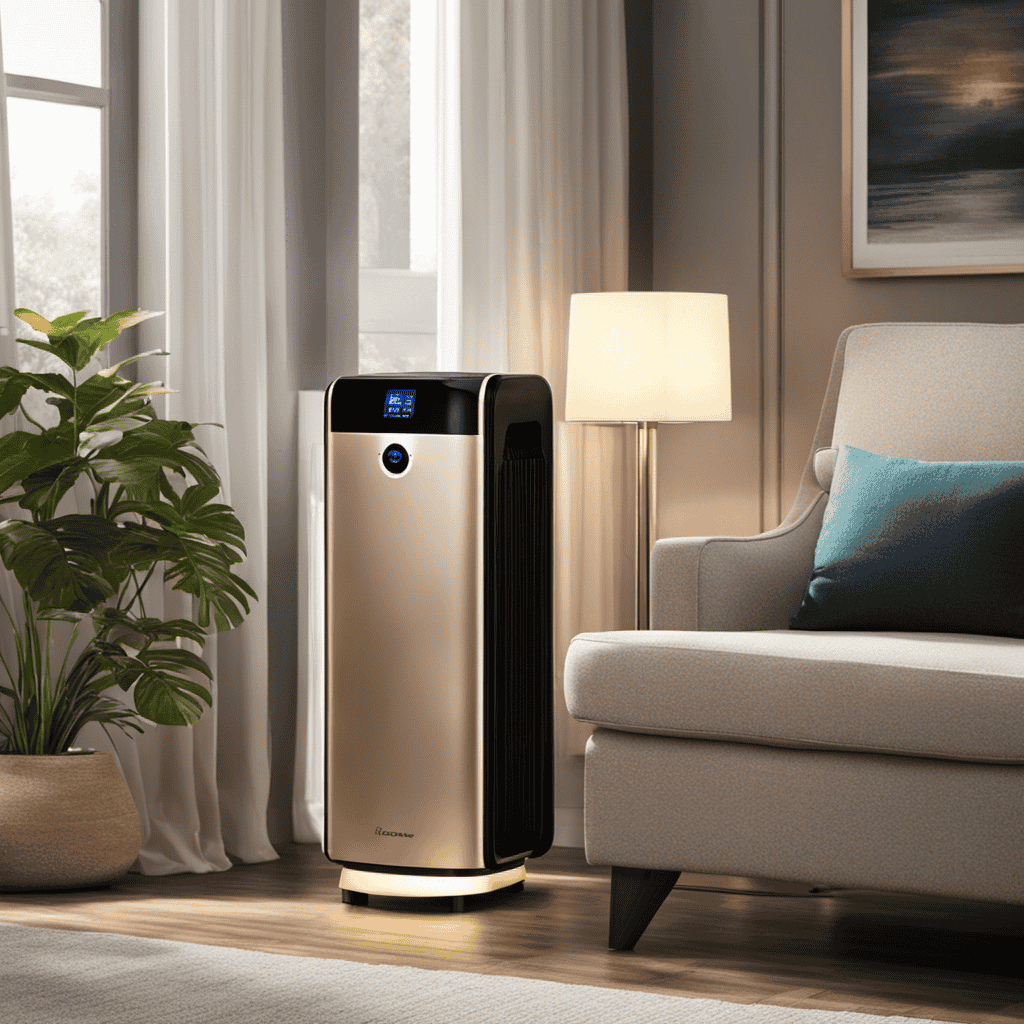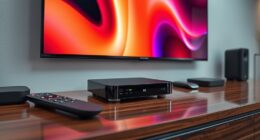I, being a proud air purifier owner, frequently ponder about the frequency of filter changes needed for my device. It feels like trying to find clarity in a foggy situation, uncertain of the optimal timing.
But fear not, for this article will shed light on the factors affecting filter lifespan, the recommended changing frequency, and the telltale signs that it’s time for a replacement.
Additionally, I will share valuable tips on how to extend the lifespan of your filters and properly maintain your air purifier.
So let’s clear the air and dive into the world of filter maintenance.
Key Takeaways
- The frequency of air purifier usage impacts filter efficiency over time.
- Filters should be changed every 3 to 6 months for optimal performance.
- Signs that your filter needs to be replaced include reduced filter performance, clogging, reduced airflow, and decreased efficiency.
- To extend the lifespan of your filters, avoid using harsh chemicals or submerging them in water, and regularly vacuum and gently brush off dirt and debris.
Factors Affecting Filter Lifespan
One of the factors that can affect the lifespan of air purifier filters is how frequently you use the device. The more often you use the air purifier, the more particles and pollutants it will capture, leading to a decrease in filter efficiency over time.
Factors such as the air quality in your environment, the size of the room, and the level of pollutants present also impact the lifespan of the filters.
Regular filter maintenance is essential to ensure optimal filter efficiency. By cleaning or replacing the filters regularly, you can prevent the build-up of dirt and particles, ensuring that the air purifier continues to function effectively. Proper maintenance also helps to extend the lifespan of the filters and ensures that the air purifier continues to provide clean and healthy air.
Now, let’s discuss the recommended filter changing frequency.
Recommended Filter Changing Frequency
The recommended frequency for changing the filters in an air purifier is typically every 3 to 6 months. Regular maintenance of air purifier filters is crucial to ensure optimal performance and clean indoor air. Here are four important points to consider regarding the importance of regular filter maintenance and common misconceptions about filter lifespan:
-
Improved air quality: Regularly changing filters helps remove allergens, dust, and other airborne particles, improving air quality and reducing allergies and respiratory issues.
-
Filter efficiency: Over time, filters become clogged with dirt and debris, reducing their effectiveness. Regular replacement ensures maximum filtration and efficiency.
-
Prolonged lifespan: Contrary to popular belief, frequent filter changes actually extend the lifespan of your air purifier. Clogged filters strain the motor, leading to premature failure.
-
Energy efficiency: Clean filters allow air purifiers to operate more efficiently, consuming less energy and reducing electricity costs.
Signs That Your Filter Needs to Be Replaced
If your filter’s performance has noticeably declined, it may be time for a replacement. Common filter problems can occur over time, such as clogging, reduced airflow, and decreased efficiency.
Clogging happens when dust and debris accumulate, causing the filter to become less effective in capturing pollutants. Reduced airflow occurs when the filter becomes too dirty, hindering the proper circulation of air through the purifier. Decreased efficiency means that the filter is no longer effectively removing contaminants from the air.
To address these issues, it is important to consider cost-effective filter replacements. Look for filters that have high efficiency ratings and are compatible with your air purifier model. Additionally, consider filters that offer a longer lifespan, as they can provide better performance and save you money in the long run.
How to Extend the Lifespan of Your Filters
To extend the lifespan of your filters, it’s important to regularly clean and maintain them. Here are some tips to help you keep your filters in optimal condition:
-
Benefits of using activated carbon filters:
- Activated carbon filters are highly effective at removing odors and harmful gases from the air.
- They can also capture volatile organic compounds (VOCs) and other chemical pollutants.
-
Common mistakes to avoid when cleaning air purifier filters:
- Never use harsh chemicals or abrasive materials to clean the filters, as this can damage them.
- Avoid washing or submerging the filters in water, as this can cause them to lose their effectiveness.
-
Gently vacuum the surface of the filters to remove larger particles and dust.
-
Consider using a soft brush to gently remove any remaining dirt or debris from the filters.
By following these tips, you can ensure that your filters are clean and functioning properly, which will help extend their lifespan and maintain the efficiency of your air purifier.
Now let’s move on to some tips for properly maintaining air purifier filters.
Tips for Properly Maintaining Air Purifier Filters
Here’s a simple trick for keeping your air purifier filters in top shape: regularly vacuum and gently brush off any dirt or debris.
By doing this, you can prevent common filter problems and enjoy the benefits of clean air filters.
Over time, air purifier filters can become clogged with dust, pollen, and other particles, reducing their effectiveness. Regular maintenance is essential to keep them functioning optimally.
Vacuuming the filters helps to remove larger particles, while gently brushing off any remaining dirt or debris ensures a thorough clean.
By maintaining clean air filters, you can improve the air quality in your home or office, reduce allergens, and promote better respiratory health.
Frequently Asked Questions
Can I Use a Different Brand of Filters in My Air Purifier?
Yes, you can use alternative filter options in your air purifier. However, it is important to consider compatibility concerns. Different brands may have different sizes or specifications, so make sure to check if they are compatible with your air purifier model.
How Do I Clean or Wash My Air Purifier Filters?
I usually change the filters in my air purifier every few months to keep it working efficiently. It’s important to replace them regularly to ensure clean air and maximize the benefits of using an air purifier in my home.
Is It Necessary to Replace the Pre-Filter Along With the Main Filter?
Replacing the pre-filter along with the main filter in an air purifier is important. The pre-filter helps to extend the lifespan of the main filter by removing larger particles, ensuring optimal performance and efficiency.
Can I Reuse My Air Purifier Filters After Cleaning Them?
Reusing air purifier filters after cleaning is possible but not recommended. Proper filter maintenance involves replacing them regularly to ensure optimal performance. Neglecting this can compromise air quality and reduce the effectiveness of the purifier.
Are There Any Specific Environmental Factors That Can Shorten the Lifespan of Air Purifier Filters?
Environmental factors, such as high levels of air pollution or excessive dust and pet dander, can significantly shorten the lifespan of air purifier filters. Regular maintenance, including frequent filter changes, is crucial to ensure optimal performance and prolong filter life.
Conclusion
In conclusion, changing the filters in your air purifier is an absolute breeze! With a frequency that seems as rare as a blue moon, you’ll be delighted by how often you get to replace them.
Just imagine the joy of spending your precious time carefully maintaining and extending their lifespan, all while enjoying the sweet scent of clean air.
So, don’t delay, embrace the excitement of filter changing and revel in the irony of this truly captivating task.
